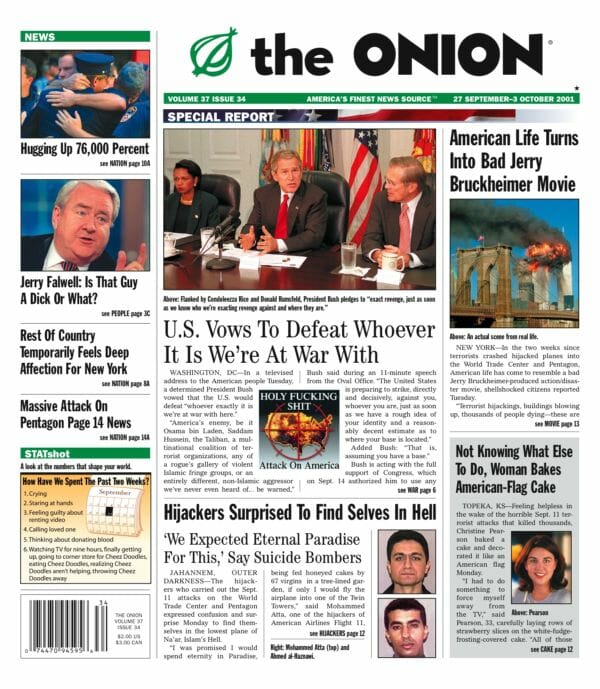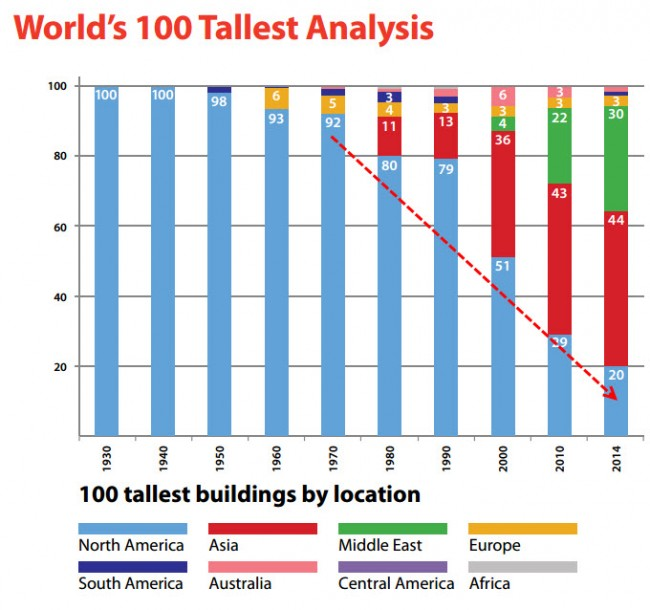Artists and 9/11
Nick Gillespie discusses the difficulty artists have had grappling with 9/11, and suggests two that did a particularly good job. I was not familiar with the Elton John performance and it did not really move me seen today out of context from its original airing. But I did see the documentary "Man on Wire" and think it's fabulous -- the world is made better by peaceful eccentrics and Philippe Petit's story of walking a tightrope between the twin towers is amazing. It should be noted that he developed his overpowering vision of walking a wire between the two towers before he had ever once climbed on a tightrope.
I would like to add one more successful artistic treatment of 9/11 -- the Onion's 9/11 issue. The issue was in its way as brave as Petit's tightrope walk, as it came out when no one was joking about the tragedy (hell, no one really attempts to address it with humor to this day). But the Onion staff put out an amazing issue that was both funny and respectful and a spot-on tribute.
The entire archive is here, keep scrolling some of the best are at the bottom. But even the small throwaway details are great -- who else in September of 2001 could have written the (likely spot-on) headline "Rest of Country Temporarily Feels Deep Affection for New York"? And perhaps it is just me, but I still laugh at stuff like this, particularly in this age of virtue-signalling.
Dinty Moore Breaks Long Silence On Terrorism With Full-Page Ad
NEW YORK—Nearly two weeks after the attacks on the World Trade Center and Pentagon, the makers of Dinty Moore beef stew finally weighed in on the tragedy Monday with a full-page ad in USA Today. "We at Dinty Moore extend our deepest sympathies to all who have been affected by the terrible events of Sept. 11, 2001," read the ad, which pictured a can of Dinty Moore beef stew at the bottom of the page. "The entire Dinty Moore family is outraged by this heinous crime and stands firmly behind our leaders." Dinty Moore joins Knoche Heating & Cooling and Tri-State Jacuzzi in condemning terrorism.
Direct links to a few of the lead articles:
U.S. Vows To Defeat Whoever It Is We're At War With (an article that highlights what is still the major problem in the supposed war on terror)
Hijackers Surprised To Find Selves In Hell
For those who are younger and don't remember the day that well, the last article may seem a little random, but one of the odd reactions one heard everywhere on 9/11 was people saying that the jets ramming the towers and the later collapse of the towers all looked like a movie, like things we only expected to see in special effects and not in real life.
Speaking of movies, I was in Manhattan that day -- in the championship of bad timing awards, I was scheduled to make a presentation at 9am on 9/11 to a group of investors asking them to invest in our commercial aviation internet venture, making the pitch that the commercial aviation industry (which had been slumping a bit) was poised for a turnaround. Anyway, one thing I have never seen reported much is what Manhattan was like that night. I was stuck in the city, planning to leave the next day in the last rental car available. I was wandering the city looking for dinner, happy I suppose to have been only lightly touched by the disaster, not knowing yet that several of my friends from business school had died that morning. The authorities had been letting everybody leave the island through the bridges and tunnels, but no one, not even taxis or public transportation, was being allowed back in. By the evening, the city was deserted, like a scene out of a post-apocalyptic movie. Perhaps one car every 10 minutes came through Times Square. The quiet was astounding, probably the quietest the city had been then or since for 200 years.


